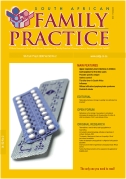Reflections on the Training of PMTCT Counsellors in Motivational Interviewing in Sub-Saharan Africa
Keywords:
HIV prevention, Prevention of mother to child transmission (PMTCT), Counselling, Infant Feeding, Motivational Interviewing
Abstract
Introduction: Within the Southern African prevention of mother to child transmission (PMTCT) programmes, counsellors talk with pregnant mothers about a number of interrelated decisions and behaviour changes. Current counselling has been characterised as ineffective in eliciting behaviour change and as adopting a predominantly informational and directive approach. Motivational interviewing (MI) was chosen as a more appropriate approach to guide mothers in these difficult decisions, as it is designed for conversations about behaviour change. MI has not previously been attempted in this context. This paper reflects on how MI can be incorporated successfully into PMTCT counselling and what lessons can be learnt regarding how to conduct training with counsellors. Methods: Thirty-eight lay and nurse counsellors at four sites in Southern Africa were trained in MI. After the initial training, they participated in a five-month inquiry group at each site, where an action researcher (AR) facilitated ongoing learning of new counselling skills and reflection. Transcripts of recorded counselling sessions were then analysed using the motivational interviewing treatment integrity (MITI) code to assess their skills in MI. The MITI analysis was discussed with the action researchers and a consensus was reached on how to improve training. Results: Overall, the counsellors showed a global rating score of four out of seven, a reflection-to-question ratio of 0, a 43% open question score, an 18% complex reflection score and a 58% MI-adherent score. There were significant differences between the sites and between nurses and lay counsellors (p < 0.05). The action researchers suggested that the following factors were important in enabling learning and change: assessment of the baseline level of skills and readiness to change, reflection on real consultations, differences between the ARs and counsellors, a focus on the overall spirit of MI versus technical skills, the approach to information giving, managerial support and an appreciative versus a critical facilitation style. Conclusion: Nurse counsellors in Namibia and Swaziland demonstrated beginning proficiency in MI, while lay counsellors in South Africa did not. From the dialogue with the action researchers, nine recommendations were made to guide the development of future training programmes.
Published
2008-02-20
Section
Forum
By submitting manuscripts to SAFP, authors of original articles are assigning copyright to the South African Academy of Family Physicians. Copyright of review articles are assigned to the Publisher, Medpharm Publications (Pty) Ltd, unless otherwise specified. Authors may use their own work after publication without written permission, provided they acknowledge the original source. Individuals and academic institutions may freely copy and distribute articles published in SAFP for educational and research purposes without obtaining permission.

